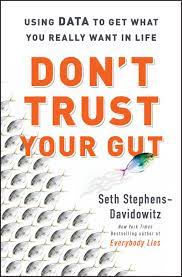You have /5 articles left.
Sign up for a free account or log in.
 Don’t Trust Your Gut: Using Data to Get What You Really Want in Life by Seth Stephens-Davidowitz.
Don’t Trust Your Gut: Using Data to Get What You Really Want in Life by Seth Stephens-Davidowitz.
Published in May 2022
Don’t Trust Your Gut is Seth Stephens-Davidowitz’s follow-up to his excellent 2017 book, Everybody Lies.
Where Everybody Lies was an exploration of Google searches as a big data research tool, Don’t Trust Your Gut is about leveraging big data for personal growth.
Stephens-Davidowitz, a trained economist and former Google data scientist, seeks to persuade readers that data (especially big data) are better guides to intelligent behavior than intuition or conventional wisdom.
Examples from Don’t Trust Your Gut of what everybody believes but everyone is wrong about range from entrepreneurship to relationships.
The mythology of the young (often college dropout) start-up founder persists. When we think of tech companies that made it big, our minds tend to settle on Mark Zuckerberg, Bill Gates or Michael Dell. However, the data on successful entrepreneurs contradict the archetype of the young, socially awkward (usually white male) founder.
According to research based on big data described in Don’t Trust Your Gut, the most successful entrepreneurs are experienced professionals in their 40s, 50s or even older. The people who start and run businesses that make money are demographically diverse and have worked for years (often decades) in the industry in which their business is situated.
On the relationship side, Don’t Trust Your Gut describes a range of studies demonstrating how badly we understand how couples meet or what keeps them together. Analyzing the data from dating apps, Stephens-Davidowitz shares that being judged good-looking is excellent for getting lots of dates but suboptimal for forming long-lasting relationships.
As an ever-larger proportion (perhaps the majority) of new relationships begin on dating apps and sites, the data from these platforms offer terrific opportunities for research. Some results described in Don’t Trust Your Gut on dating include:
- A: If you want many dates, your dating profile should emphasize extremes in behaviors, looks or predilections. What you want is a few people to really want to date you, rather than many people being lukewarm on an average set of traits.
- B: It is a myth that conventionally less attractive people (whatever that means) can’t get dates with conventionally attractive folks (whatever that means). According to the data, the key is to message as many people as possible. Dating success, as in other endeavors in life, is mostly about maximizing opportunities.
Don’t Trust Your Gut is full of data-driven stories designed to aid self-improvement. What is the higher ed connection? (And you know, I always have to find one.)
In reading Don’t Trust Your Gut, I kept thinking about how the goal of making data-driven decisions in how we run our colleges and universities always seems to be “just around the corner.”
For years, we have recognized the existential necessity of having data guide the design and operations of our institutions. This goal is not controversial. Few in higher ed would argue against the desirability of utilizing data for institutional decision making.
And yet …
One of the challenges to data-driven decision making that Don’t Trust Your Gut illuminates is moving from the individual to the organization. It is easier to base our individual decisions on data than to leverage data to make organizational choices.
Don’t Trust Your Gut is a fun read, but we need a book that integrates a big data perspective with the literature on how organizations (and universities) change.
Perhaps if enough of us in the higher ed world read and talked about Don’t Trust Your Gut, we might discover alternative paths to the data-driven university.
What are you reading?




